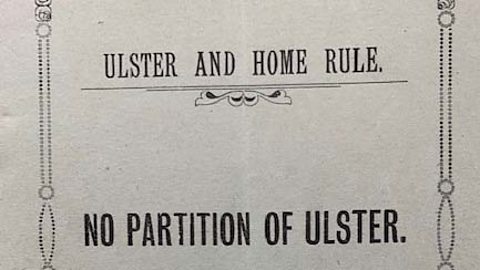The Act of Union
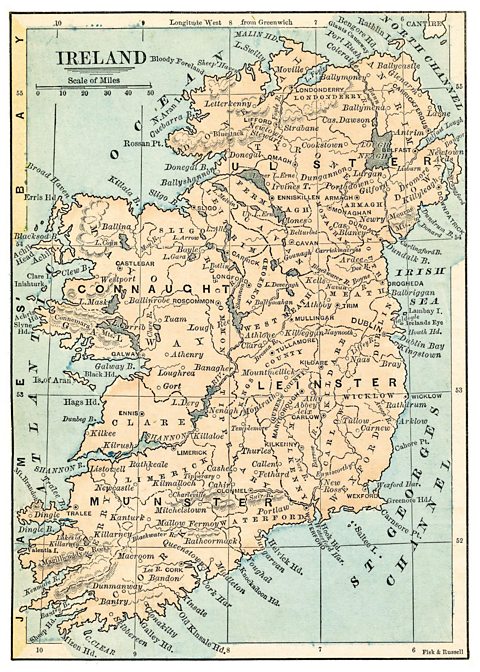
At the beginning of the 20th century there was no such place as Northern Ireland and no such place as the Republic of Ireland. Ireland was one country.
All of Ireland was governed by Britain. It had been that way since the Act of Union was passed in 1800. The Act of Union was a law that meant that all of the decisions about Ireland were made in the Parliament in London, though Ireland did get to send 100 MPs there.
Therefore Ireland was not independent and did not have its own government.

Nationalists and the Union
Many people in Ireland disliked the Union and wanted it changed or removed to give Irish people more say over decisions relating to Ireland. They were referred to as Nationalists.
They tended to be members of the Catholic majority and had a greater sense of Irish identity.
In general terms a Nationalist is someone who wants to see their nation become a self-governing state. Those that seek to do this peacefully are called Constitutional Nationalists.
Events such as the Famine of the 1840s had greatly fuelled Nationalist dislike of the Union.
91»»±¨ Rule and the Irish Parliamentary Party (IPP)
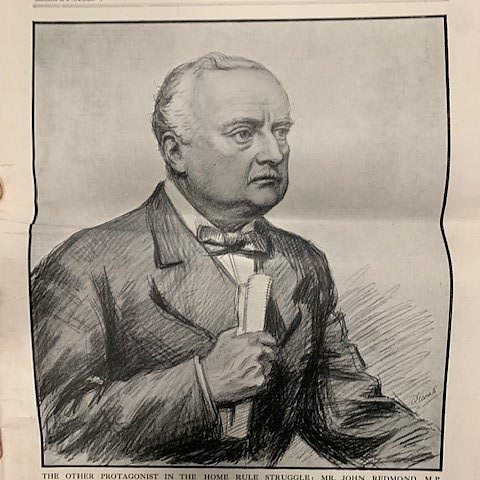
In the second half of the 19th Century, a political party called the Irish Parliamentary Party (IPP) was created to further the Nationalist cause.
They wanted to see a plan called 91»»±¨ Rule put into action.
Key points about 91»»±¨ Rule
- 91»»±¨ Rule meant setting up of a parliament in Dublin to look after Irish affairs, with Ireland remaining part of the British Empire.
- The IPP tried to get 91»»±¨ Rule passed into law on two occasions, but on both occasions it was defeated in Parliament in London. In 1886 it was stopped in the House of Commons; in 1893 it was defeated in the House of Lords.
- The push for 91»»±¨ Rule then died down for a number of years, but then in 1912 the IPP did a political deal with the ruling British Liberal government, which needed the support of IPP MPs to remain in power. As a result 91»»±¨ Rule looked certain to become law.
- The law to introduce 91»»±¨ Rule passed through the House of Commons in 1912, but faced opposition in the House of Lords. At that time the House of Lords could delay a Bill for two years, so 91»»±¨ Rule would not come into into effect until 1914.
In the intervening two years events would move very quickly during what was known as the 91»»±¨ Rule Crisis.

The 91»»±¨ Rule Crisis
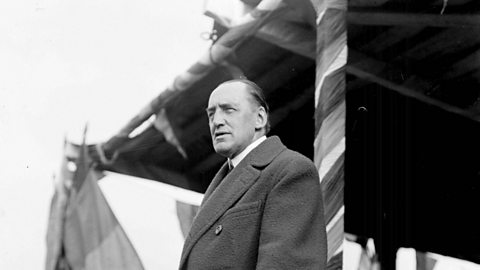
The Protestants of North East Ulster did not want to see the end of the Act of Union and felt it was important to their religious freedom and their businesses.
Led by Dublin barrister Edward Carson and Belfast businessman James Craig they organised protests and petitions such as the Solemn League and Covenant, however the most dangerous development at this time was the formation of a paramilitary group, the Ulster Volunteer Force (UVF). Its aim was to prevent the introduction of 91»»±¨ Rule.
The Irish Volunteer Force
- In response to the setting up of the UVF, the prominent Nationalist, Eoin MacNeill called for the setting up of a similar organisation to ensure that 91»»±¨ Rule came about.
- The Irish Volunteer Force (IVF) initially had a membership of almost 100,000 men. It continued to grow and after a short time it would come under the control of John Redmond, the leader of the IPP.

A difficult situation
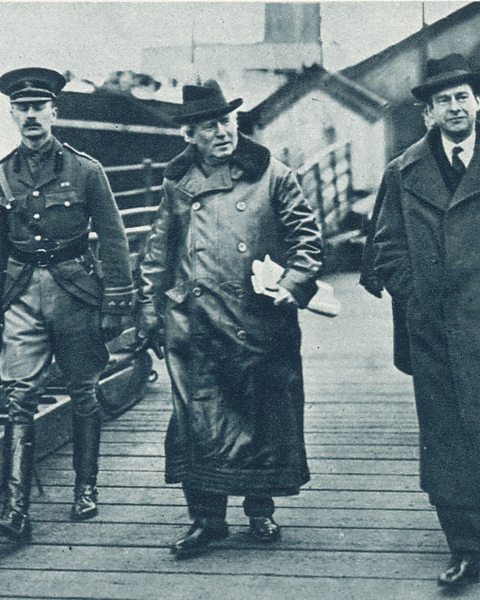
These developments put the government in London in a very difficult position.
They were dealing with mass movements, with the ever present threat of violent civil war.
Delivering on 91»»±¨ Rule was beginning to look like a huge task and one that carried a large amount of risk.
There were also doubts as to whether the army in Ireland could be relied upon to enforce the new law, given that many of its officers came from Unionist backgrounds.
To try and resolve the crisis Herbert Asquith, the Prime Minister, invited the leaders of all the main parties to a conference at Buckingham Palace in July 1914.
One idea that was raised, was to temporarily ‚Äòexclude‚Äô counties in Ulster from the 91»»±¨ Rule scheme for a period of six years.
However, the conference broke up without any firm agreement. Almost immediately, attention turned to events in Europe where the continent was quickly descending into war.

91»»±¨ Rule postponed
When the Great War began in August 1914 Asquith decided that 91»»±¨ Rule would not be implemented until the conflict in Europe was over.
Both the Unionists and Nationalist leaderships felt that support for the war could strengthen their position. As a result:
- Carson asked that the UVF be allowed to serve as one regiment in the army and they became the 36th Ulster Armoured division.
- Redmond also urged members of the Irish Volunteers to join Irish regiments.
However by the time the Great War ended in November 1918, the situation in Ireland would be radically altered.
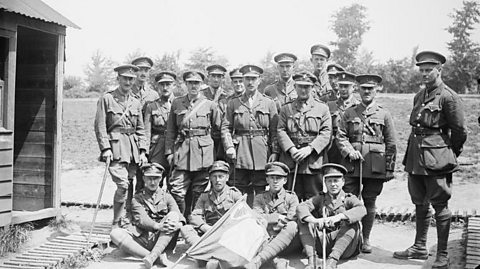
Watch: 91»»±¨ Rule Video
Max Heartrate asks 91»»±¨ Rule - what even is that?
DIRECTOR: Standby on the floor.
DIRECTOR: Coming to you camera two.
DIRECTOR: Cue on two.
DIRECTOR: Mix-through.
MAX No time for that! Hello! I’m Max Heartrate and this is Knowledge Express. Information faster than a cricket in a cockpit. And today’s topic is…
MAX Right. 91»»±¨ Rule.
MAX What even is that?
MAX It‚Äôs 1912 and Britain decides that Ireland needs a parliament to rule themselves at home rather than by the government in London. Sounds good? NO! Not if you‚Äôre a Northern Unionist. They‚Äôre scared that 91»»±¨ Rule means Rome Rule. They didn‚Äôt much fancy the Roman Catholic majority in the South lording it over them. Northern Unionists are worried 91»»±¨ Rule will mean the loss of their identity and economic decline.
MAX So, these two lads - Edward Carson and James Craig write the Ulster Covenant which promises to keep Ulster British by any means and to defeat what they see as the conspiracy to set up a 91»»±¨ Rule Parliament in Ireland.
MAX Nearly half a million men and women signed on the dotted line. They decide to back up their words by forming an armed force - the Ulster Volunteers. This doesn’t go down well in Dublin where Irish Nationalists form the Irish Volunteers who to protect the rights and liberties of the people of Ireland.
MAX To make matters worse both sides start importing guns. But, before they start fighting, in 1914 the First World War breaks out which means thousands of men from all over the island go off to war in France and Belgium and postpone their argument in Ireland for a different day.
MAX The 91»»±¨ Rule Bill is shelved until the war is over which everyone thought would happen soon. WRONG! It dragged on for four years. But in 1919 the government brought the 91»»±¨ Rule idea back. Unionists were outraged because thousands of them had died defending Britain. They weren‚Äôt very happy at all.
Quiz: How much do you know?
More on Causes and consequences of partition
Find out more by working through a topic
- count2 of 3
